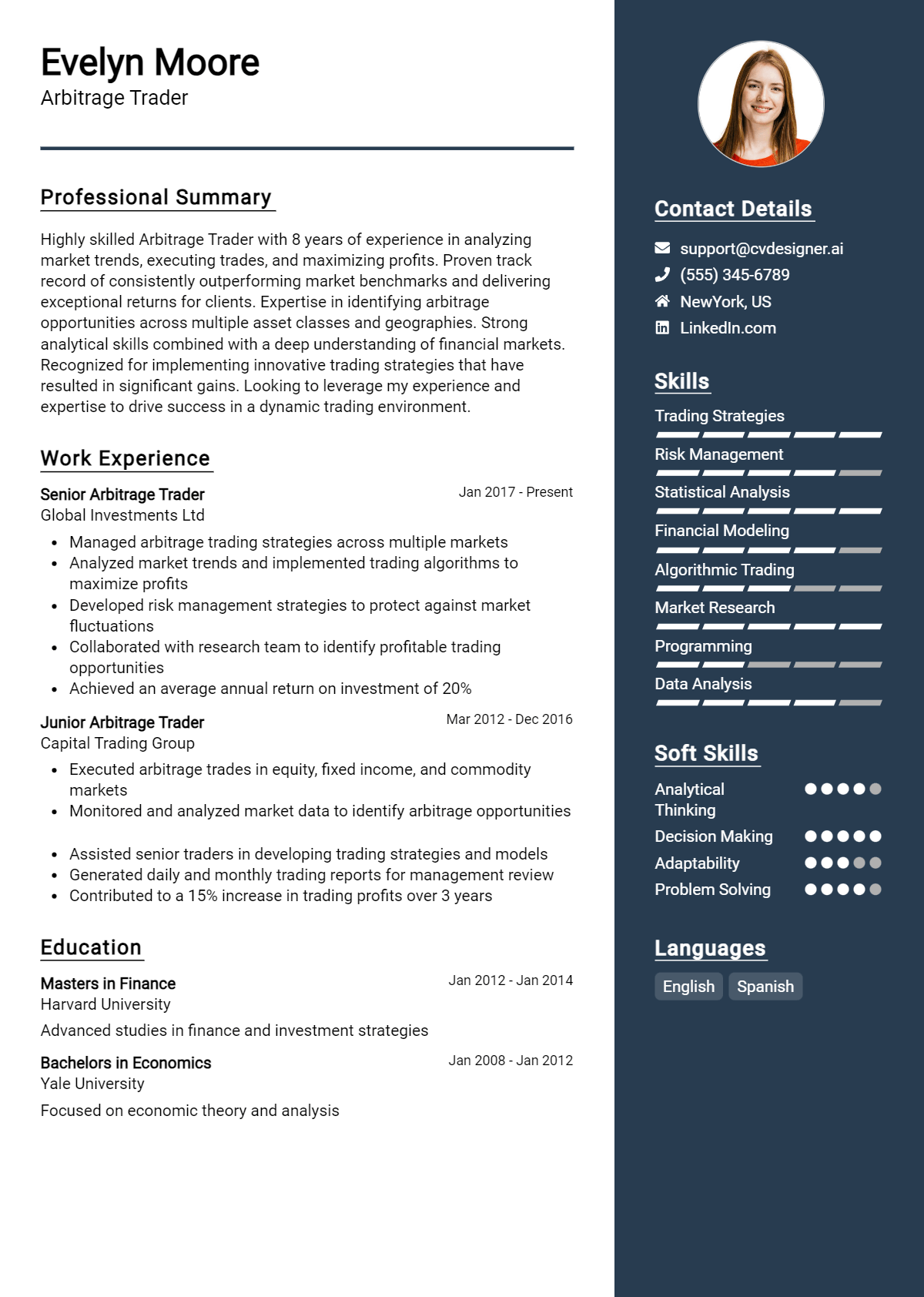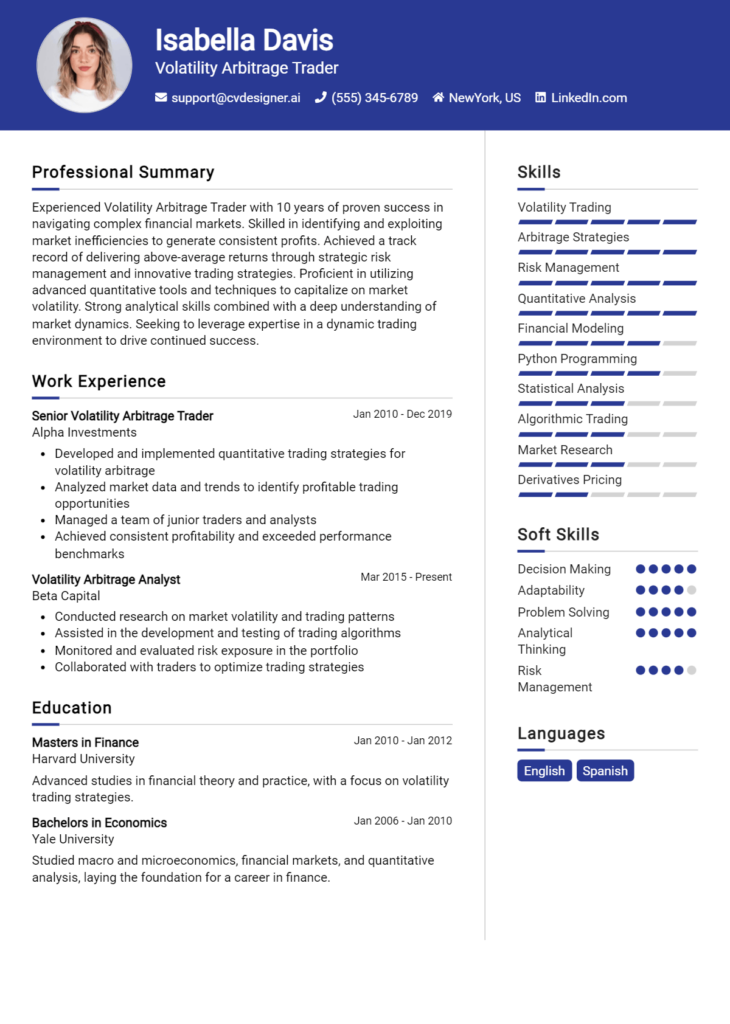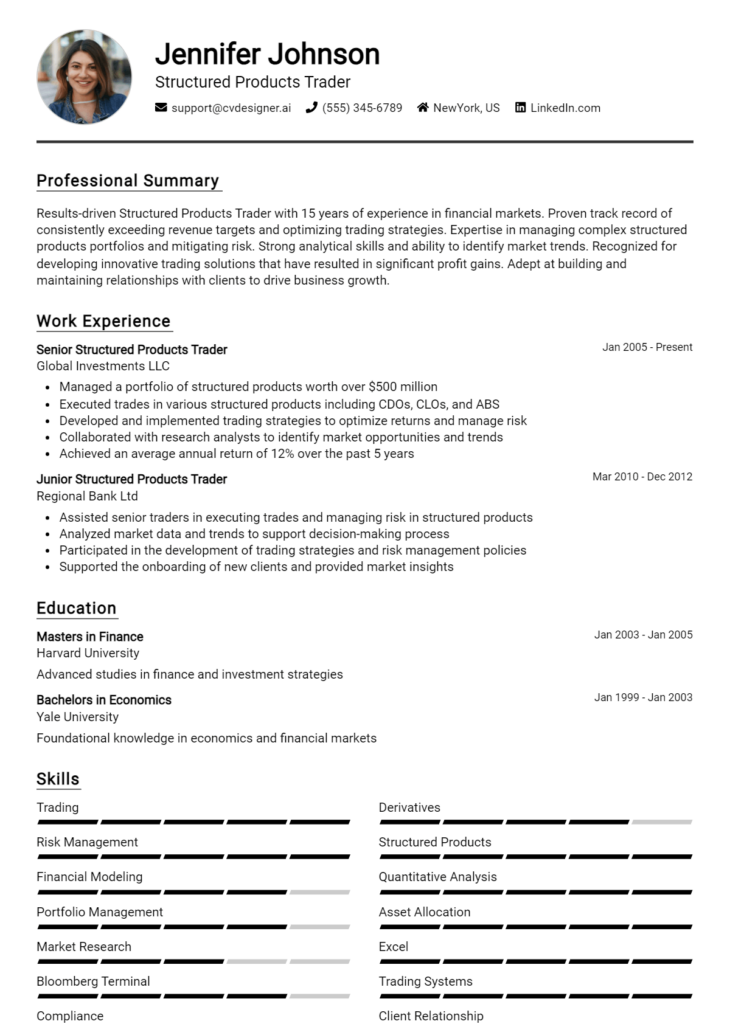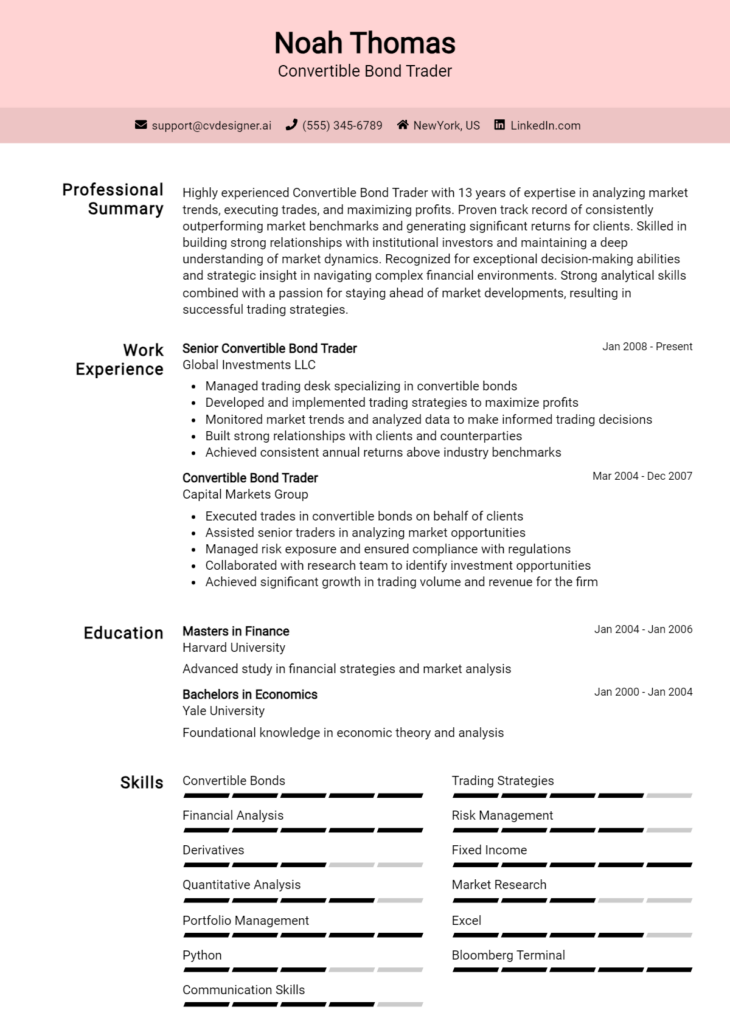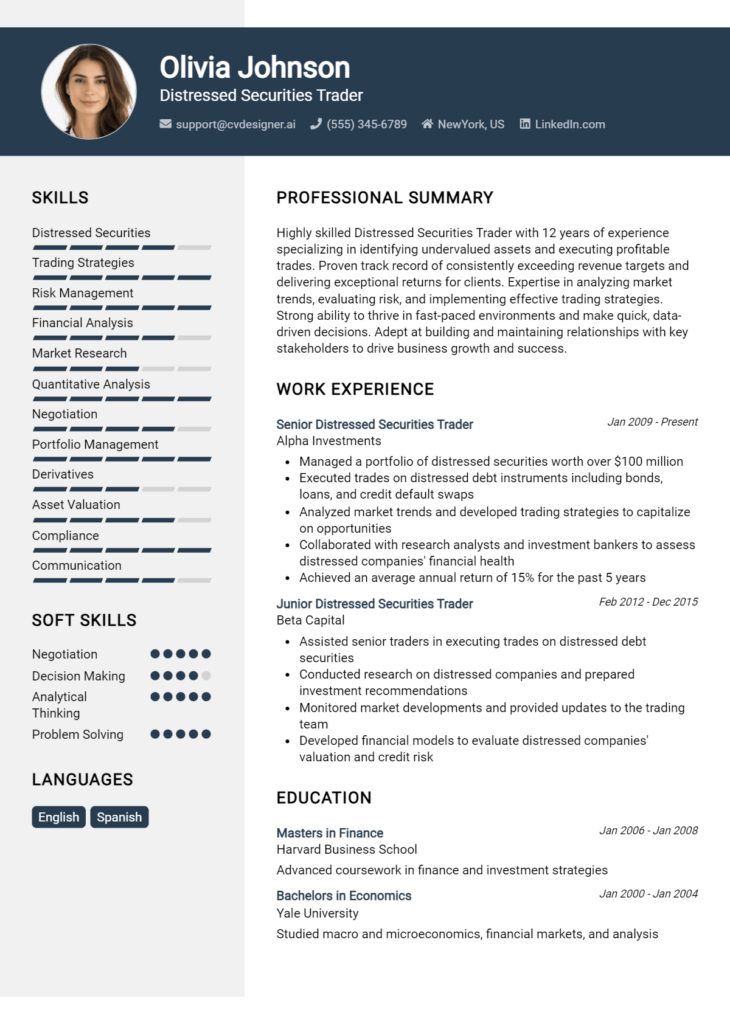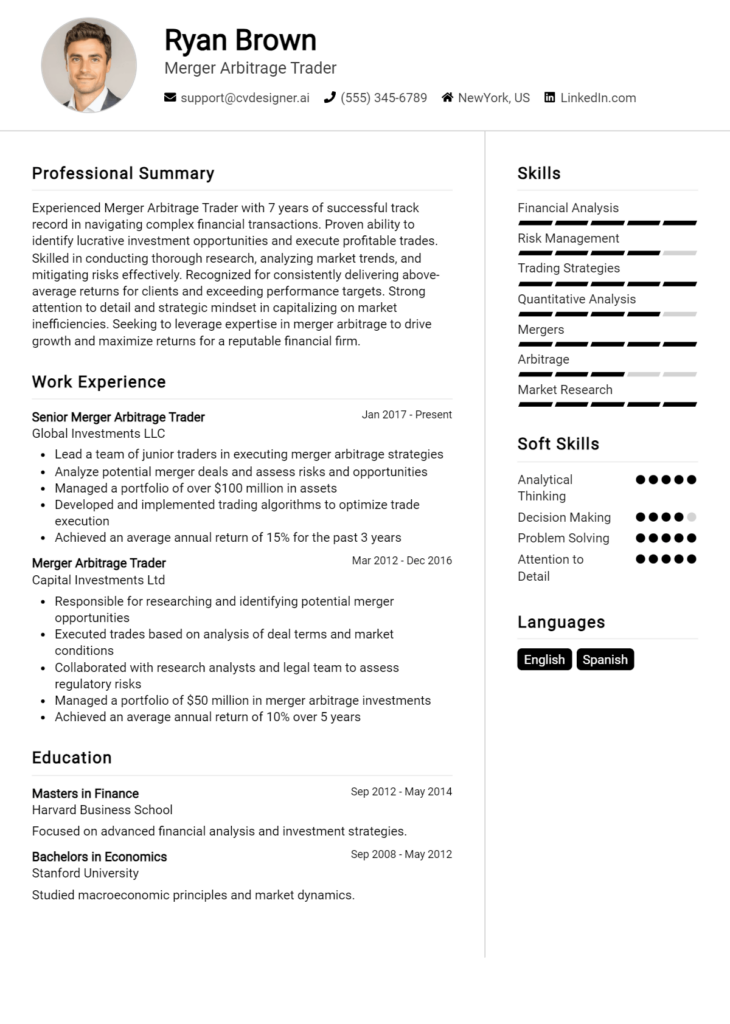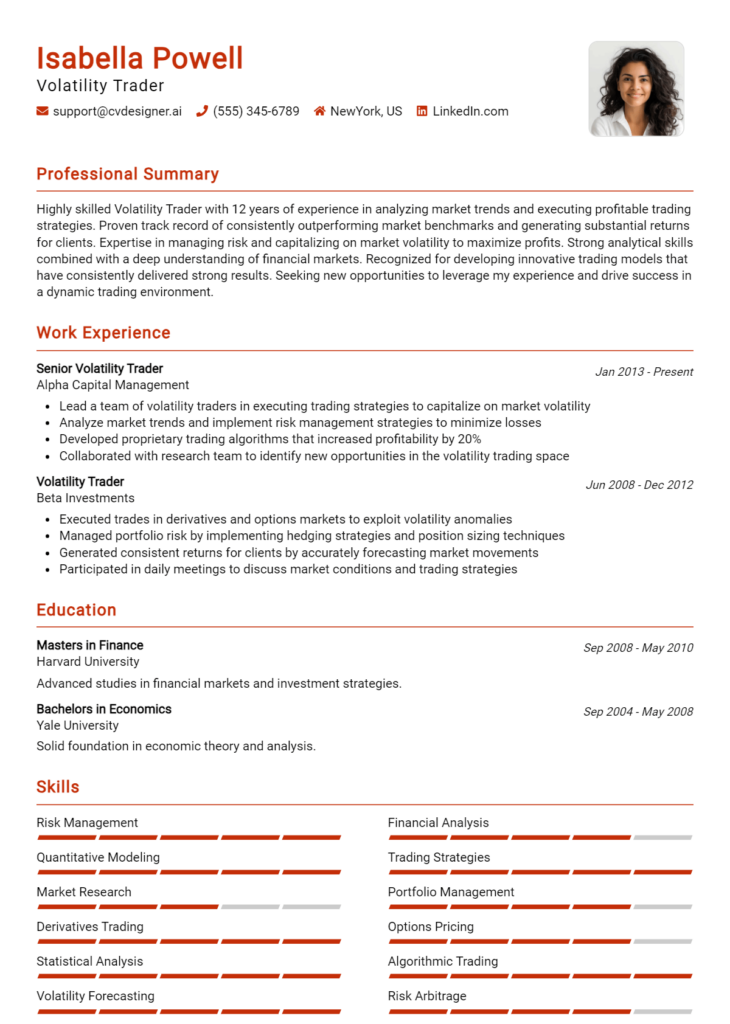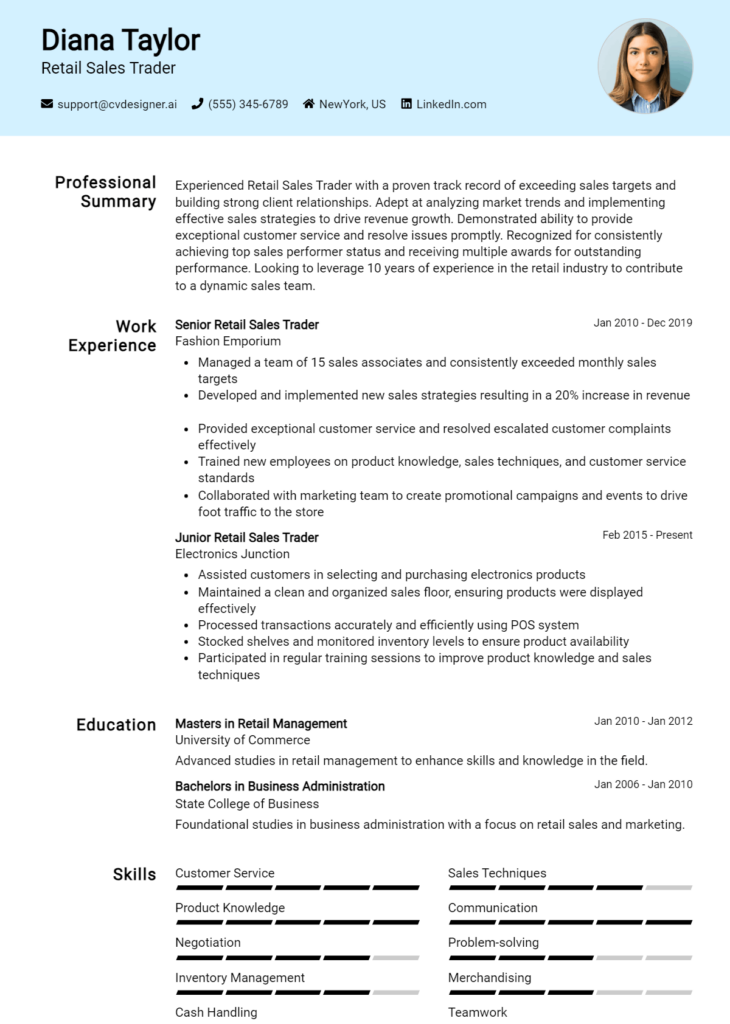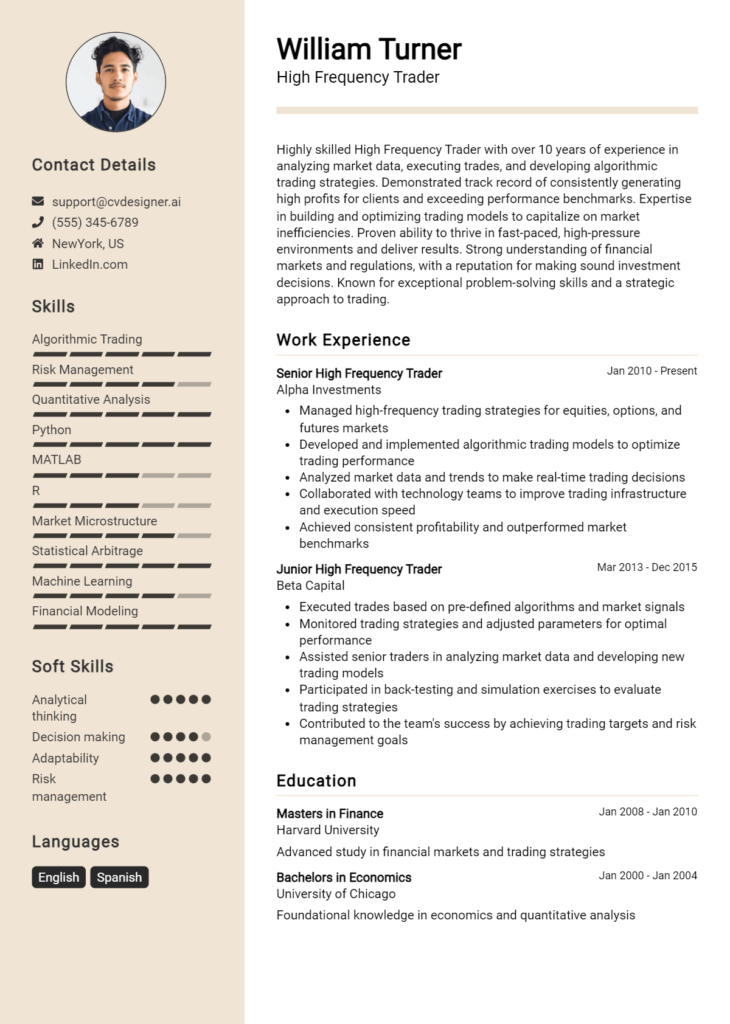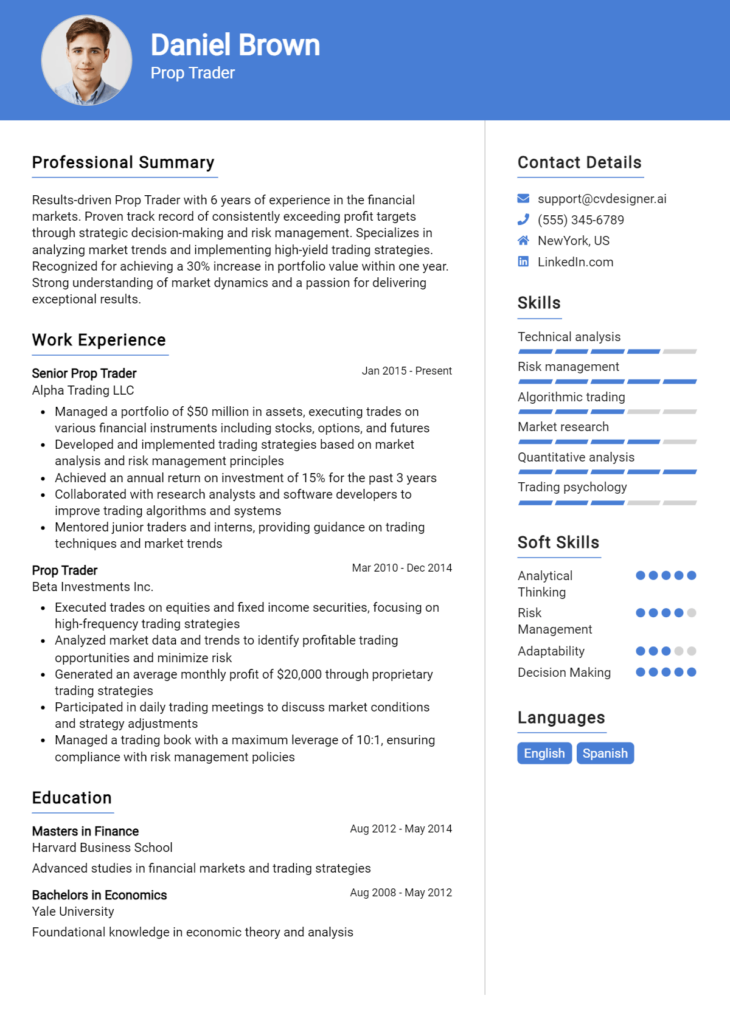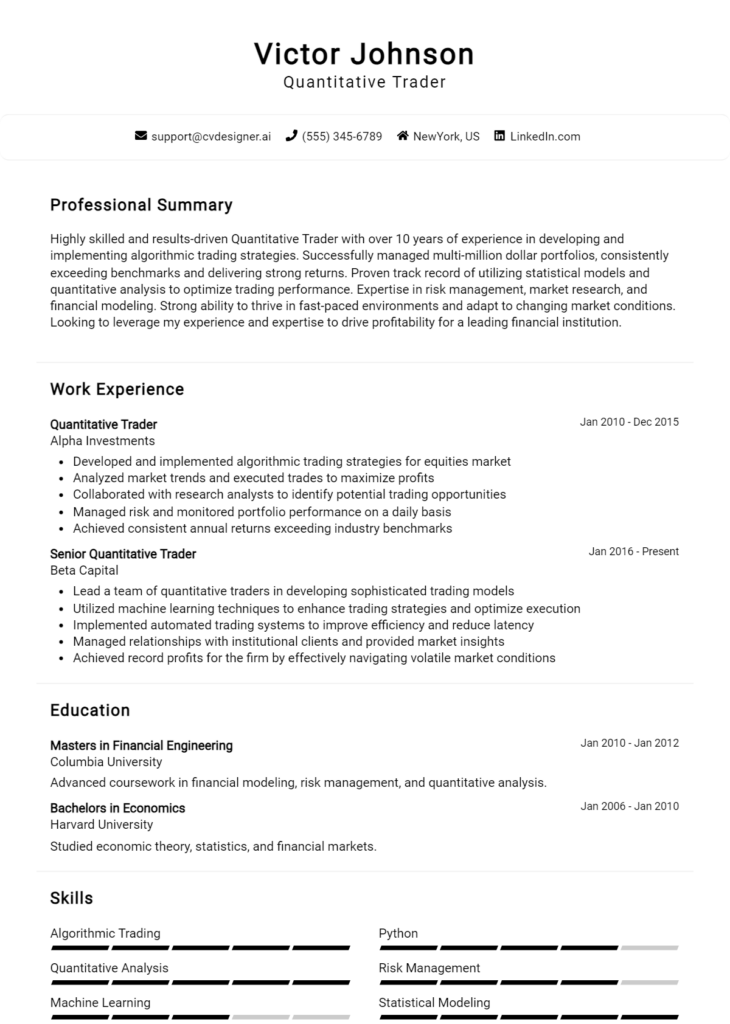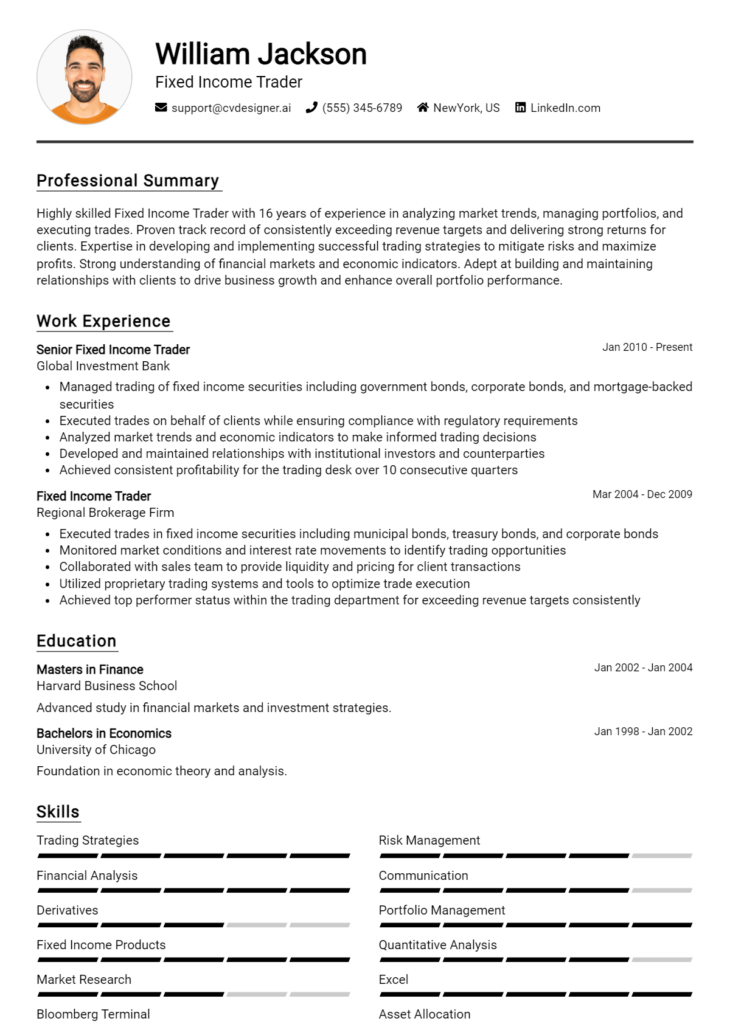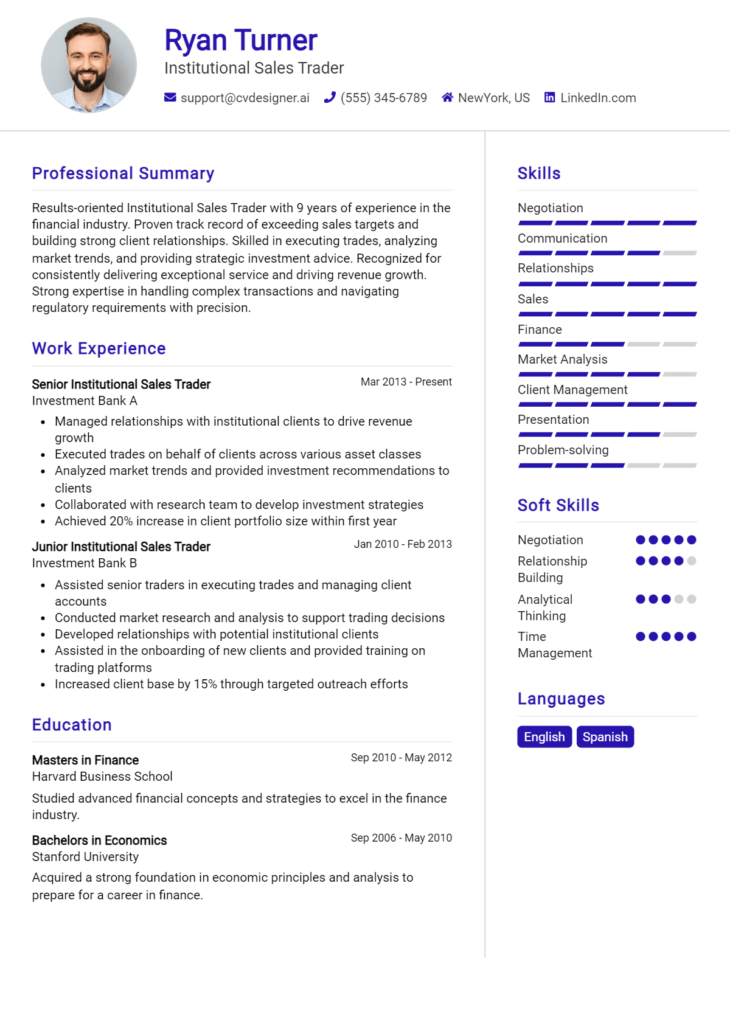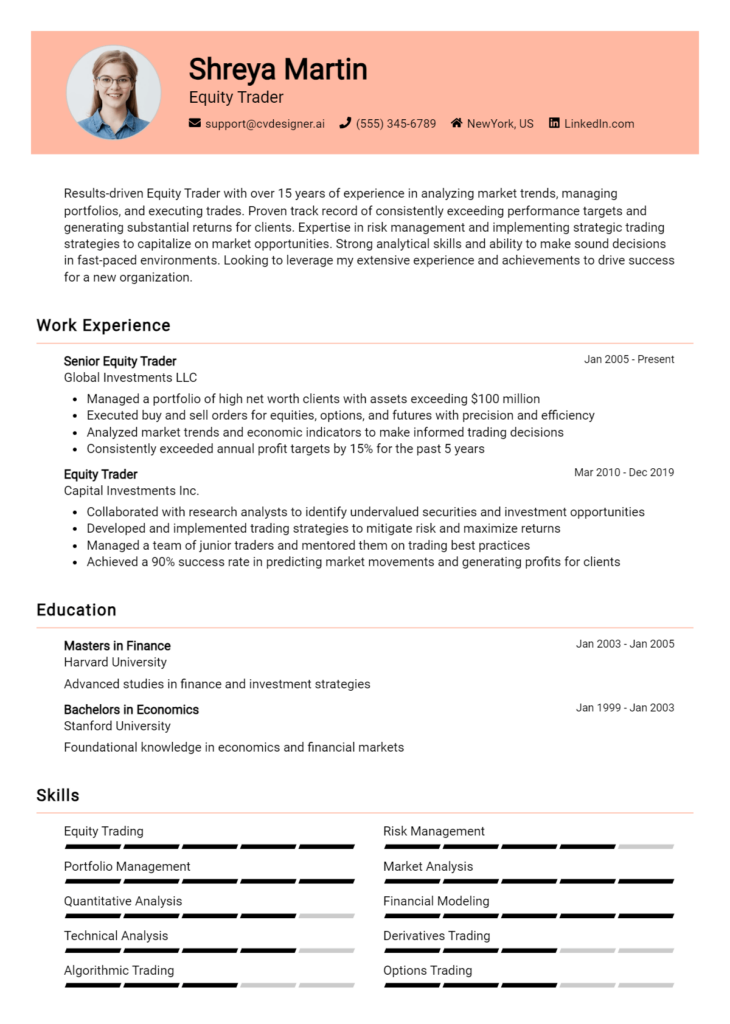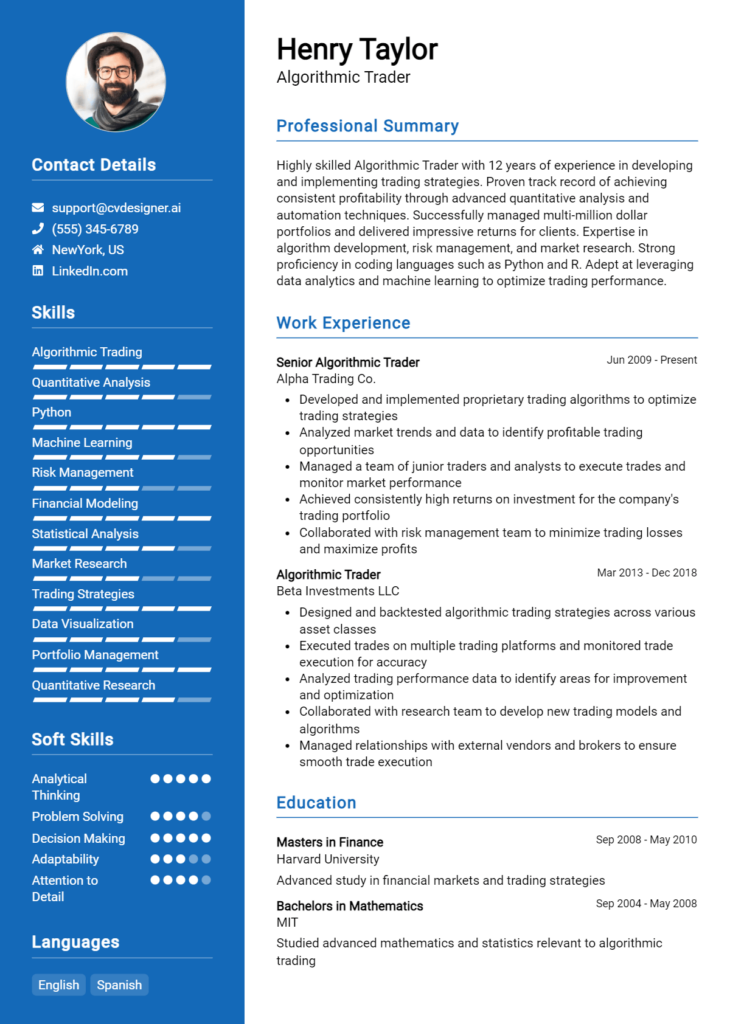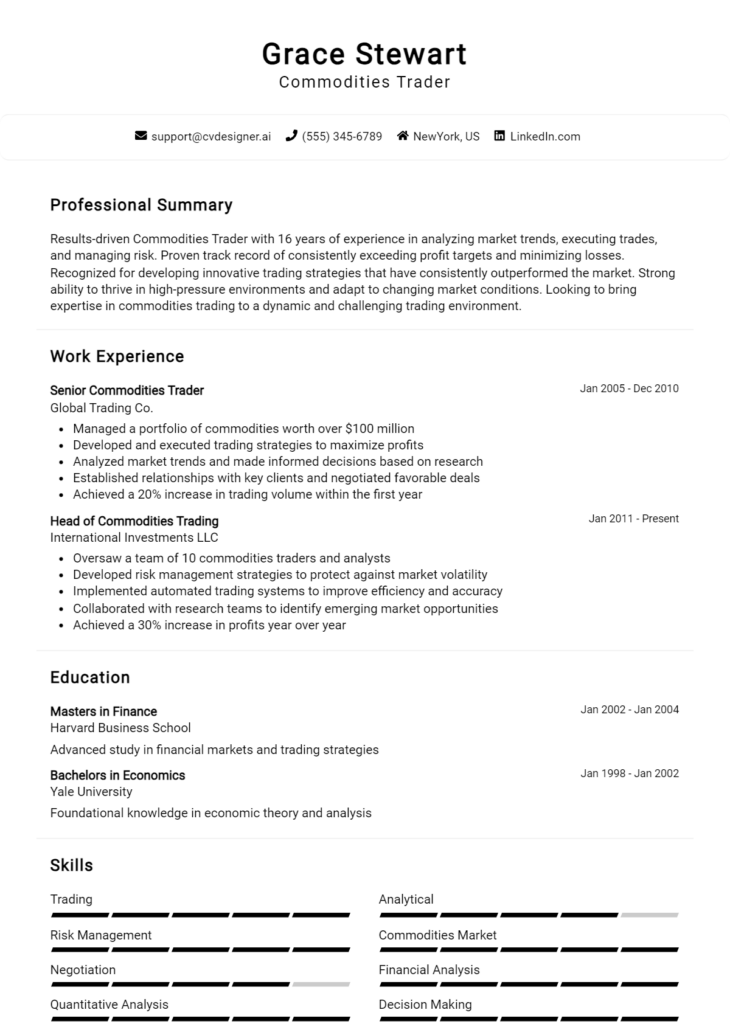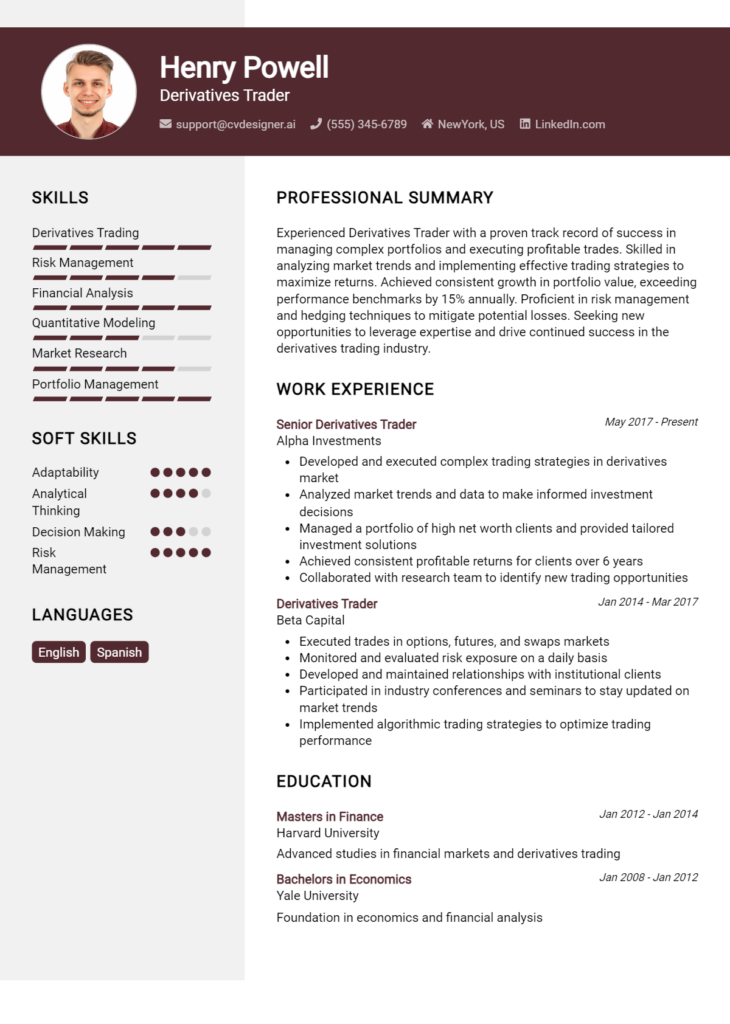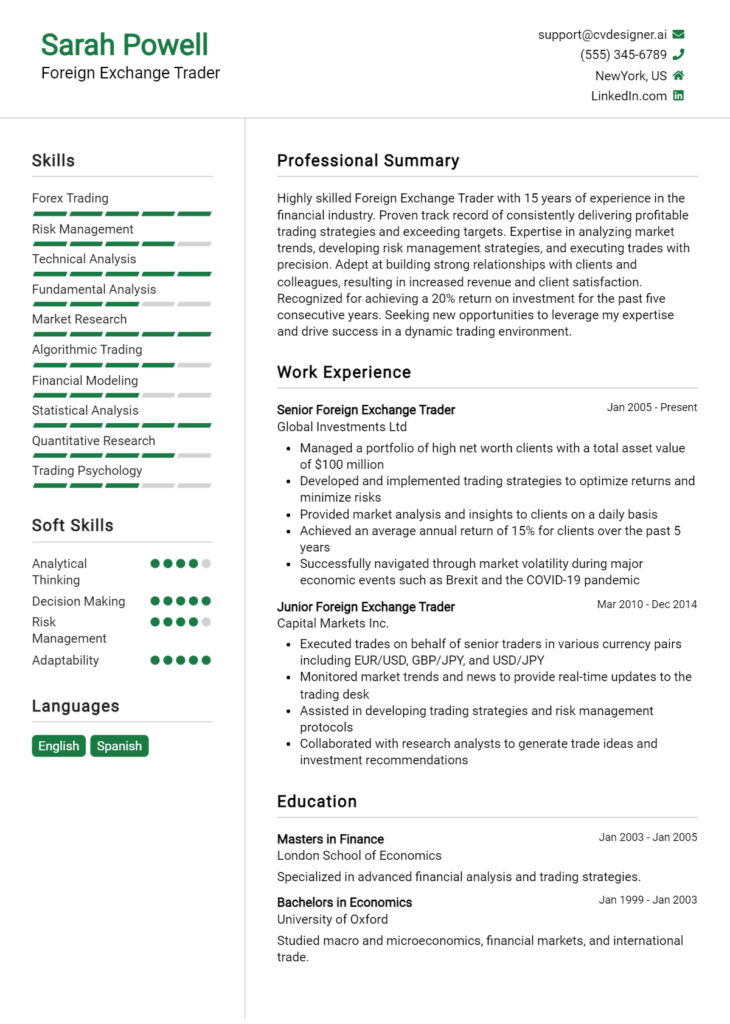Arbitrage Trader Core Responsibilities
An Arbitrage Trader is responsible for identifying and capitalizing on price discrepancies across different markets or exchanges. This role requires strong analytical skills, technical proficiency in trading platforms, and a keen eye for operational efficiency. By bridging the gap between trading, risk management, and finance departments, an Arbitrage Trader plays a crucial role in optimizing profits and minimizing risks. Problem-solving abilities are essential, as they contribute to the organization’s overall goals by ensuring effective trade execution and strategy implementation. A well-structured resume highlighting these qualifications can significantly enhance career prospects.
Common Responsibilities Listed on Arbitrage Trader Resume
- Analyze market trends and price fluctuations across multiple platforms.
- Execute trades to take advantage of price discrepancies.
- Develop and implement trading strategies based on research and analysis.
- Monitor and manage risk exposure across various asset classes.
- Collaborate with finance and risk management teams to enhance trading strategies.
- Utilize quantitative models to forecast market movements.
- Maintain accurate records of trades and transactions for compliance.
- Stay updated on market news and economic indicators affecting trading.
- Perform post-trade analysis to assess performance and refine strategies.
- Leverage technology and software tools for trading efficiency.
- Communicate findings and strategies to stakeholders effectively.
High-Level Resume Tips for Arbitrage Trader Professionals
In the competitive field of arbitrage trading, a well-crafted resume is crucial for standing out among a pool of qualified candidates. Your resume is often the first impression you make on a potential employer, and it serves as a powerful marketing tool that showcases your skills, achievements, and unique qualifications. For arbitrage traders, it is essential to convey not only your technical expertise but also your ability to identify and capitalize on market inefficiencies. This guide will provide practical and actionable resume tips specifically tailored for arbitrage trader professionals, ensuring that your application captures the attention of hiring managers and sets you on the path to success.
Top Resume Tips for Arbitrage Trader Professionals
- Tailor your resume to the job description by incorporating relevant keywords and phrases that align with the specific requirements of the position.
- Highlight your experience in trading strategies, risk management, and market analysis to demonstrate your expertise in arbitrage trading.
- Quantify your achievements with specific metrics, such as percentage returns, profit margins, or successful trades, to give potential employers a clear picture of your capabilities.
- Showcase any certifications or training relevant to trading, such as CFA, CMT, or advanced courses in financial analysis, to enhance your credibility.
- Include technical skills that are specific to the industry, such as proficiency in trading software, data analysis tools, or programming languages like Python or R.
- Demonstrate your understanding of market trends and fluctuations by including examples of how you have successfully navigated challenging market conditions.
- Utilize a clean and professional layout that makes your resume easy to read, ensuring important information is easily accessible.
- Incorporate a summary statement at the beginning of your resume that encapsulates your experience and passion for arbitrage trading.
- Keep your resume concise, ideally within one page, focusing on the most relevant information that will catch the attention of hiring managers.
By implementing these tips, you can significantly increase your chances of landing a job in the arbitrage trading field. A well-structured and targeted resume not only showcases your qualifications but also demonstrates your commitment to the profession, making you a compelling candidate for potential employers.
Why Resume Headlines & Titles are Important for Arbitrage Trader
In the competitive field of arbitrage trading, a resume headline or title serves as a crucial first impression. It acts as a powerful summary of a candidate's qualifications, skills, and experience, allowing hiring managers to quickly assess the applicant's fit for the role. A strong headline not only captures attention but also effectively conveys the essence of the candidate's professional brand in a concise manner. By choosing words that are relevant to the job and highlight key strengths, candidates can make a memorable impact right from the start, setting the stage for the rest of their resume.
Best Practices for Crafting Resume Headlines for Arbitrage Trader
- Keep it concise: Aim for a headline that is impactful yet succinct, ideally under 10 words.
- Be role-specific: Tailor the headline to reflect the specific position of arbitrage trader.
- Highlight key strengths: Use words that emphasize your core competencies and achievements.
- Use industry keywords: Incorporate relevant terminology that aligns with the arbitrage trading field.
- Showcase unique selling points: Identify what sets you apart from other candidates.
- Avoid jargon: Ensure clarity by using straightforward language that is easily understood.
- Reflect your experience level: Indicate whether you are a seasoned professional or an emerging talent.
- Make it eye-catching: Utilize strong action verbs or results-oriented language to grab attention.
Example Resume Headlines for Arbitrage Trader
Strong Resume Headlines
"Results-Driven Arbitrage Trader with 5+ Years of Experience in Forex Markets"
“Quantitative Analyst Turned Arbitrage Trader Specializing in Algorithmic Strategies”
“Expert in High-Frequency Trading: Proven Track Record of 20% Annual Returns”
“Dynamic Arbitrage Trader with a Focus on Equity Derivatives and Market Analysis”
Weak Resume Headlines
“Trader Looking for Opportunities”
“Experienced Professional in Finance”
The strong headlines are effective because they are specific, highlight relevant experience, and use industry language that resonates with hiring managers. Each headline immediately conveys critical information about the candidate's strengths and specialties in arbitrage trading. In contrast, the weak headlines fail to impress due to their vagueness and lack of detail, leaving the hiring manager with little understanding of the candidate's qualifications or unique offerings. A compelling headline can be the difference between capturing interest or being overlooked in a competitive job market.
Writing an Exceptional Arbitrage Trader Resume Summary
A resume summary is a critical component for an Arbitrage Trader, as it serves as the first impression for hiring managers who often sift through numerous applications. A well-crafted summary quickly captures attention by succinctly showcasing key skills, relevant experience, and notable accomplishments in the field of trading. This concise yet impactful introduction not only highlights the candidate's qualifications but also aligns them with the specific requirements of the job they are applying for, making it easier for employers to see their potential fit for the role.
Best Practices for Writing a Arbitrage Trader Resume Summary
- Quantify Achievements: Use numbers and percentages to demonstrate your success and impact in previous roles.
- Focus on Relevant Skills: Highlight specific skills that are relevant to arbitrage trading, such as analytical abilities, risk management, and market analysis.
- Tailor the Summary: Customize your summary for each job application to align with the job description and required qualifications.
- Be Concise: Keep your summary brief, ideally around 3-5 sentences, to ensure clarity and maintain the reader's attention.
- Use Action Verbs: Start sentences with strong action verbs to convey confidence and proactivity.
- Showcase Industry Knowledge: Include terminology and concepts specific to arbitrage trading to demonstrate your expertise.
- Highlight Relevant Tools: Mention any trading platforms, software, or analytical tools you are proficient in that are pertinent to the role.
- Emphasize Team Collaboration: If applicable, showcase your ability to work in teams or collaborate with other traders and analysts.
Example Arbitrage Trader Resume Summaries
Strong Resume Summaries
Results-driven Arbitrage Trader with over 5 years of experience in identifying and capitalizing on market inefficiencies. Achieved a 25% increase in portfolio returns through strategic trading and risk management techniques. Proficient in using advanced trading platforms and analytical tools to execute high-frequency trades.
Detail-oriented financial professional with a strong background in arbitrage trading, successfully executing over 100 trades per month, yielding an average profit margin of 15%. Skilled in quantitative analysis and market forecasting, with a proven ability to react swiftly to market changes.
Dynamic Arbitrage Trader with a focus on currency and commodity markets, having generated an annualized return of 30% for institutional clients. Expertise in statistical arbitrage strategies and a solid understanding of macroeconomic indicators.
Weak Resume Summaries
Experienced trader looking for a new opportunity in arbitrage. I have worked in finance for several years and am familiar with various trading practices.
I am a motivated individual with experience in trading. I want to use my skills in a new role as an Arbitrage Trader.
The strong resume summaries are effective because they are specific, quantify achievements, and demonstrate relevant skills directly applicable to arbitrage trading. They convey the candidate's expertise and results in a compelling manner. In contrast, the weak summaries lack specificity, fail to provide measurable outcomes, and appear overly generic, making it difficult for hiring managers to gauge the candidate's true capabilities and fit for the role.
Work Experience Section for Arbitrage Trader Resume
The work experience section of an Arbitrage Trader resume is critical as it serves as a comprehensive showcase of a candidate's technical skills, leadership capabilities, and ability to deliver high-quality trading results. This section not only highlights relevant experiences but also quantifies achievements that reflect the candidate's proficiency in the field. Aligning past experiences with industry standards is essential for demonstrating the candidate's value to potential employers, making it clear that they can navigate the complexities of arbitrage trading successfully.
Best Practices for Arbitrage Trader Work Experience
- Clearly outline your technical expertise in trading platforms, algorithms, and data analysis tools.
- Quantify your achievements using metrics such as ROI, profit margins, or percentage growth.
- Highlight experiences where you successfully managed or collaborated with teams to achieve trading goals.
- Use industry-specific terminology to demonstrate familiarity with arbitrage and trading concepts.
- Showcase problem-solving abilities through examples of how you addressed trading challenges.
- Incorporate keywords from the job description to ensure alignment with industry standards.
- Detail your role in the development or implementation of trading strategies or systems.
- Focus on results-driven statements that emphasize your contribution to the organization's success.
Example Work Experiences for Arbitrage Trader
Strong Experiences
- Led a team of five traders in executing a high-frequency trading strategy that achieved an annual ROI of 25%, outperforming the market average by 10%.
- Developed and implemented a proprietary algorithm that increased trading efficiency by 30%, resulting in a profit increase of $500,000 over six months.
- Collaborated with cross-functional teams to design and launch a new trading platform, enhancing user experience and increasing customer retention by 15%.
- Analyzed market trends and data, successfully identifying arbitrage opportunities that generated additional revenue of $300,000 in Q2.
Weak Experiences
- Worked on various trading strategies that may or may not have been successful.
- Assisted in the trading department with some tasks as needed.
- Participated in team meetings regarding trading activities without specific contributions.
- Gained some experience in trading algorithms but details are unclear.
The examples listed as strong experiences are considered effective because they provide concrete results and demonstrate leadership, quantifiable outcomes, and collaboration, all of which are essential in the field of arbitrage trading. Conversely, the weak experiences are vague and lack specific achievements or metrics, making them less impactful and failing to showcase the candidate's true capabilities in the industry.
Education and Certifications Section for Arbitrage Trader Resume
The education and certifications section of an Arbitrage Trader resume is crucial as it showcases the candidate's academic foundation and commitment to professional development in the financial trading industry. This section not only highlights relevant degrees and specialized training but also underscores the candidate's continuous learning efforts, which are essential in a rapidly evolving market. By providing details on coursework, industry-recognized certifications, and any additional training, candidates can enhance their credibility and demonstrate their alignment with the demands of the Arbitrage Trader role.
Best Practices for Arbitrage Trader Education and Certifications
- Include degrees in finance, economics, mathematics, or related fields to establish a strong academic foundation.
- List industry-recognized certifications like Chartered Financial Analyst (CFA) or Financial Risk Manager (FRM) to enhance credibility.
- Highlight relevant coursework, such as financial modeling, risk management, and quantitative analysis, to demonstrate specialized knowledge.
- Showcase any ongoing education or training programs related to trading strategies or market analysis.
- Be specific about the institution and graduation dates to provide context and validity to your qualifications.
- Prioritize certifications and courses that are widely recognized in the industry to appeal to employers.
- Keep the section concise and relevant, focusing only on qualifications that directly support the Arbitrage Trader role.
- Consider including any practical trading experience or internships that complement formal education.
Example Education and Certifications for Arbitrage Trader
Strong Examples
- Bachelor of Science in Finance, University of Chicago, 2021
- Chartered Financial Analyst (CFA) Level I, 2022
- Certificate in Quantitative Finance, New York Institute of Finance, 2023
- Advanced Trading Strategies Course, Coursera, 2023
Weak Examples
- General Studies Diploma, Local Community College, 2015
- Certificate in Basic Accounting, Online Course, 2018
- High School Diploma, Anytown High School, 2010
- Outdated Forex Trading Certification, 2015
The strong examples are considered effective because they demonstrate relevant educational backgrounds and specialized certifications that directly align with the skills and knowledge required for an Arbitrage Trader. These qualifications illustrate a commitment to the field and readiness to tackle the complexities of trading. In contrast, the weak examples fail to provide relevant or up-to-date credentials that would support a career in arbitrage trading, thereby weakening the candidate's overall profile in a competitive job market.
Top Skills & Keywords for Arbitrage Trader Resume
As an Arbitrage Trader, showcasing the right skills on your resume is crucial for standing out in a competitive job market. The ability to identify price discrepancies across different markets and execute trades quickly requires a unique blend of analytical prowess, technical knowledge, and interpersonal skills. Highlighting your skills not only demonstrates your qualifications but also gives potential employers insight into your trading strategies and decision-making processes. A well-crafted resume that emphasizes both hard and soft skills can significantly enhance your chances of landing an interview in this fast-paced field.
Top Hard & Soft Skills for Arbitrage Trader
Soft Skills
- Analytical Thinking
- Attention to Detail
- Problem-Solving
- Effective Communication
- Time Management
- Stress Management
- Team Collaboration
- Adaptability
- Critical Thinking
- Negotiation Skills
Hard Skills
- Market Analysis
- Quantitative Trading
- Risk Management
- Financial Modeling
- Technical Analysis
- Algorithmic Trading
- Knowledge of Financial Instruments
- Trading Platforms Proficiency
- Statistical Analysis
- Excel and Data Visualization Tools
By incorporating these essential skills into your resume, along with relevant work experience, you can present a compelling case for your capabilities as an Arbitrage Trader.
Stand Out with a Winning Arbitrage Trader Cover Letter
I am writing to express my interest in the Arbitrage Trader position at [Company Name]. With a strong background in quantitative analysis and a passion for capital markets, I am excited about the opportunity to leverage my skills to identify and exploit pricing inefficiencies across various markets. My academic background in finance, combined with hands-on experience in trading, has equipped me with the analytical tools necessary to navigate the complexities of arbitrage trading effectively.
In my previous role at [Previous Company Name], I successfully developed and implemented trading strategies that capitalized on market discrepancies. By utilizing advanced statistical models and real-time data analysis, I was able to achieve a consistent track record of profitability while managing risk. My proficiency with trading platforms and programming languages such as Python and R has allowed me to automate trading processes, significantly increasing efficiency and execution speed. I am particularly drawn to the dynamic nature of arbitrage trading, where quick decision-making and adaptability are crucial for success.
Collaboration and communication are key components of my approach to trading. I have worked closely with cross-functional teams to design models that enhance trading strategies and provide insights into market trends. My ability to analyze data and present findings in a clear and concise manner has fostered a culture of informed decision-making and continuous improvement within my team. I am eager to bring this collaborative spirit to [Company Name] and contribute to its innovative trading strategies.
I am excited about the possibility of joining [Company Name] as an Arbitrage Trader and contributing to the team's success with my analytical mindset and strategic thinking. Thank you for considering my application. I look forward to the opportunity to discuss how my skills and experiences align with the goals of your organization.
Common Mistakes to Avoid in a Arbitrage Trader Resume
When crafting a resume for an Arbitrage Trader position, it's essential to highlight your unique skills and experiences effectively. However, many candidates make common mistakes that can hinder their chances of landing an interview. Avoiding these pitfalls can make a significant difference in how potential employers perceive your qualifications and fit for the role. Here are some common mistakes to watch out for:
Generic Objective Statements: Using a vague or generic objective can make your resume feel impersonal. Tailor your objective to reflect your specific interest in arbitrage trading and how your skills align with the company's goals.
Overloading with Technical Jargon: While it's important to showcase your technical skills, excessive jargon can alienate readers who may not be familiar with specific terms. Strike a balance between demonstrating expertise and ensuring clarity.
Neglecting Quantifiable Achievements: Many traders fail to include quantifiable results from their previous roles. Use numbers to showcase your performance, such as profits generated, percentage returns on investments, or successful trades executed.
Ignoring Relevant Experience: Candidates often overlook including relevant experience outside of direct trading roles. Highlight transferable skills from related positions, such as risk analysis, market research, or financial modeling.
Lack of Customization: Sending out a one-size-fits-all resume can lead to missed opportunities. Customize your resume for each application by aligning your experiences and skills with the specific requirements listed in the job description.
Inadequate Education Details: Failing to mention relevant degrees or certifications can be a missed opportunity. Include your educational background, especially if you have degrees in finance, economics, or mathematics, as well as any trading certifications.
Poor Formatting and Organization: A cluttered or disorganized resume can detract from your qualifications. Use clear headings, bullet points, and consistent formatting to ensure your resume is easy to read and visually appealing.
Skipping Soft Skills: While technical skills are crucial, neglecting soft skills can be detrimental. Highlight skills such as analytical thinking, decision-making, and effective communication, which are vital for a successful arbitrage trader.
Conclusion
As an Arbitrage Trader, you play a crucial role in the financial markets by capitalizing on price discrepancies across different platforms, ensuring market efficiency. Your responsibilities may include analyzing market trends, executing trades swiftly, and managing risk effectively. A successful arbitrage trader combines analytical skills with a strong understanding of market mechanics, making it essential to showcase these competencies in your resume.
To ensure you stand out in this competitive field, take a moment to review your Arbitrage Trader resume. Highlight your experience in quantitative analysis, trading strategies, and any technical skills you possess. Tailoring your resume to reflect the specific requirements of the job you're applying for will greatly enhance your chances of landing an interview.
If you need assistance, there are numerous resources available to help you craft an impressive resume. Check out resume templates to find a design that suits your style, use a resume builder for easy formatting, and explore resume examples for inspiration. Additionally, don’t forget to create a compelling cover letter using the cover letter templates provided.
Now is the perfect time to refine your resume and ensure it reflects your skills and achievements as an Arbitrage Trader. Take action today!

